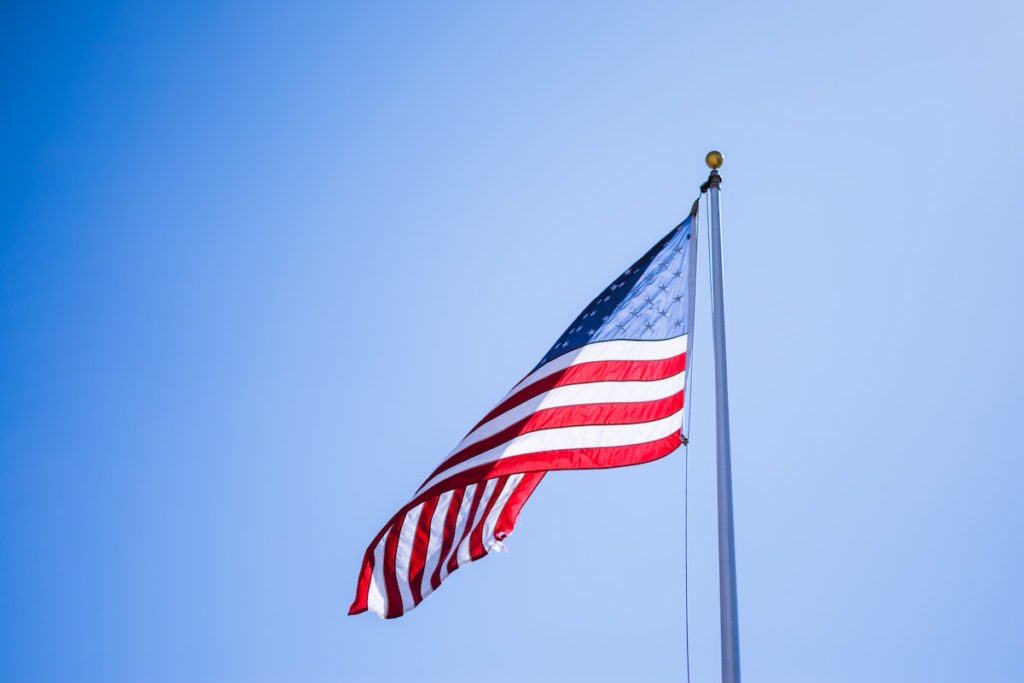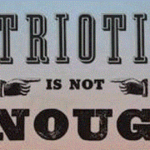September 11, 2001—a date which will live in … obscurity?
Let’s pray not.
Today—September 11, 2018—is Patriot Day. In 2002, President George W. Bush signed the first presidential proclamation, in conformity with congressional law, designating this annual day of recognition. It serves as a national day of remembrance for the nearly 3,000 innocent men and women who lost their lives on September 11, 2001. It is also a time to honor the first responders and military service members who courageously protected Americans then and who protect us still.
Following the September 11 attacks, a huge outpouring of patriotic sentiment spread throughout the nation. Prayers were lifted, ceremonies were held, and flags were flown; Americans were linked arm-in-arm in support of their country. Members from both parties of Congress stood on the steps of the Capitol and sang “God Bless America,” providing a unifying moment amidst great tragedy.
Start your day with Public Discourse
Sign up and get our daily essays sent straight to your inbox.Yet such patriotic unity proved evanescent. A few short months later the country became deeply divided over the appropriate response to the attacks. The high tide of post-9/11 patriotism quickly waned. To this day, many Americans still express a kind of ambivalence about the meaning of 9/11. Partisan political debates have created great divisions over the motivations for and responses to the 9/11 attacks, and many of the nation’s elites engage in an effort to deconstruct America’s purpose and past, further complicating the public’s mind on the meaning of America and the meaning of the attacks. Thus, it’s not surprising that no shared understanding about the lasting importance of 9/11 has ever emerged. Even so, it is clear that 9/11 was not just an attack on the individual lives of nearly 3,000 innocent Americans, as important as that is to remember. It was also a larger attack on the nation itself.
In 2018, the tide of patriotism—in no small part because of the Trump Presidency—is again on the rise. As encouraging as this development may seem, one wonders whether this tide will also have a short shelf-life. An important question emerges: what kind of patriotism will this be? On this Patriot Day, Americans should take a moment to learn from a recent American statesman who called for an “informed patriotism,” a patriotism “grounded in thoughtfulness and knowledge.”
A Guide for Recovery
In his 1985 State of the Union Address, Ronald Reagan explicitly stated a theme latent in his politics for at least two decades: his desire to ignite a second American Revolution. He said, “Let history say of us, these were the golden years—when the American Revolution was reborn, when freedom gained new life, when America reached for her best.”
On its face, Reagan’s conservative call for a second American Revolution seems paradoxical. How can someone be revolutionary and also conservative? Yet Reagan’s call for revolution implied a re-birth in the self-evident truths of 1776, found in “Nature and Nature’s God,” as the Declaration says, and which guided the creation of the Constitution in 1787.
As a result, Reagan commonly quoted leading revolutionary Thomas Paine: “We have it in our power to make the world over again.” Reagan’s claim was not to initiate a revolution overthrowing the government or to make the world over again with new modes and orders. It was, in the words of scholar Wayne Fields, a “nostalgic return” to an empowered citizenry with less government oversight of the individual and economy. It was a belief that renewal of America’s founding principles still proved possible.
In Reagan’s farewell address, he described the taproot of his philosophy of government. While he implied that he had not brought about a second American Revolution, he did take credit for two significant triumphs: first, “the economic recovery, in which the people of America created—and filled—19 million new jobs,” and second, “the recovery of our morale.” The latter he described as “the new patriotism,” which meant “the resurgence of national pride.” These two triumphs created what others called the “Reagan Revolution,” which Reagan defined as “the great rediscovery, a rediscovery of our values and our common sense.”
Like all great farewell addresses, Reagan’s ended with a dire warning. The new “national feeling is good,” he said, “but it won’t count for much, and it won’t last unless grounded in thoughtfulness and knowledge. An informed patriotism is what we want.” Thus, Reagan’s second American Revolution would require Americans to reacquaint themselves with the first. As Charles R. Kesler noted, it would be a “revolution” in one of the true meanings of the term—a complete 360-degree return to first principles. Reagan exhorted Americans to study their political principles and history, to “institutionalize” the new patriotism.
An Informed Patriotism
What will an informed patriotism—a patriotism “grounded in thoughtfulness and knowledge”—require from American citizens?
It will require a new birth of the old, permanent freedom; a reawakening of America’s attachment to the universal principles of the Declaration; and an understanding of their securement in the structure of the Constitution. In this spirit, Americans should study the lives and writings of their Founding Fathers, in addition to Abraham Lincoln, to absorb and reaffirm their ideals. Such an effort, as The Federalist teaches, would clothe the Constitution with the “veneration” and “reverence” needed to ensure its perpetuation.
It will require an understanding and appreciation of our form of government as one grounded in universal and true ideals. Mere sentimentality for the homeland as our homeland, though important, is no longer enough. It will require Abraham Lincoln’s words eulogizing Henry Clay to ring true for all Americans: “He loved his country partly because it was his own country, but mostly because it was a free country.”
Likewise, it will require the study of America the way Oliver Cromwell wished to be painted: “warts and all.” Though America has not always lived up to her own principles, it is not the fault of the principles themselves. As Steven F. Hayward pointed out, Americans must differentiate the country’s principles from its compromises, which is exactly what many of the country’s greatest heroes—such as Frederick Douglass and Martin Luther King, Jr.—have done. An informed patriotism can teach Americans where they went wrong and how to go right.
It will require a collective effort by fellow citizens to unite—regardless of race, ethnicity, class, and creed. An informed patriotism is built upon civic friendship that is undergirded by a shared history and a shared commitment to America’s principles, principles giving life to a cause beyond oneself.
It will require reinvigorating what Edmund Burke called the “little platoons” of civil society—family, church, civic associations, etc.—which provide an essential role in nurturing individuals and promoting the common good. Such non-governmental institutions create a buffer between civil society and the state, highlighting both the virtues of the state and where it mustn’t tread.
It will require the necessity of sometimes dissenting, as Wilfred McClay cogently expressed, “against the nation for the sake of the nation.” This action takes on specific relevance in defending the nation’s “higher imperatives,” namely, the securing of natural rights and the truth of “one nation under God.” An informed patriotism provides guidance for such an endeavor.
It will require academic statesmanship by America’s university professors and administrators. Such individuals must exercise prudence amidst changing and challenging circumstances in higher education, providing the kind of education students really need: one that connects them to their own past. James Madison, the father of the Constitution, noted that “a well-instructed people alone can be permanently a free people.”
It will require a rehabilitation of politics as a worthy means of changing the culture. Politics, like any institution, has its vices. Yet politics, unlike any institution, serves as the “master,” or “architectonic” science, as Aristotle taught. The political institutions and laws of a society can, and ought, to shape and nurture the culture to minimize vice and maximize virtue. Such an understanding of the relationship between politics and culture was at the heart of Reagan’s call for a second American revolution. An informed patriotism can guide politicians and would-be politicians alike toward such noble ends.
Finally, it will require a proper love of country. As C.S. Lewis persuasively taught, “love of one’s country … becomes a demon when it becomes a god.” While patriotism properly understood proves ennobling, and while Americans should thank God for their freedoms and blessings, one’s country should never displace one’s God. Lewis exhorted citizens to “keep a wary eye on the health or disease of our own love of country,” and so we should.
September 11 should serve as a day of remembrance but also as a day of reflection. We should reflect on the day, the meaning of America, and why America is worth preserving. Perhaps Patriot Day is the best day for Americans to take up Reagan’s charge and cultivate an informed patriotism. Such an effort could ignite a second American Revolution.














